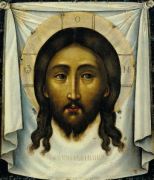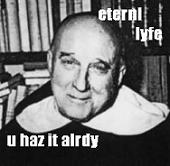I saw a report a few years ago, I think from the Lepanto Institute, about a former ‘Satanic high priest’ called Zachary King who had become a Catholic, and who reported having conducted sacrifices in abortion clinics, even involving cannibalism on one occasion. I reserved judgment about it at the time; since these ‘clinics’ are strongholds of the enemy, it wouldn’t be surprising if open witchcraft broke out inside them from time to time.
Recently I listened to a long talk that Zachary King gave at a Catholic church in the USA. He is not a credible speaker. He claims that after having been involved in a coven from the age of 13, he entered the ‘world church of Satan’ when he went to college. He says that this organisation is plotting world domination, and that he rose to be one of the highest members of it; a high wizard, no less. He also states that he was the most successful high wizard in the world, having a success rate of 92%.
Despite his eminent status in the society for world domination, High Wizard King was given the relatively humdrum task of attacking Baptist churches in the United States. His method of carrying out his mission was to infiltrate their soft furnishings’ committee (I am not making this up.) He would show up at a church and impress their pastor with his vast wealth, having 14 smart cars in his garage, and from there it was but a small step to the coveted place on the choir robes or church carpet commission. Then he would subtly turn the members of the committee against each other by spreading false reports of what they had said about each other. A moment would come when the committee would burst apart; and since, as everyone knows, a Baptist church stands or falls by its soft furnishing committee, the church itself would split, with 51% of the members going away, and 49% remaining – or it may have been the 51% who remained: anyone it was always the same proportion, which seems curious. He said repeatedly that he had carried out this operation 120 times.
I do not know how long it takes to infiltrate a Baptist soft furnishing committee. I would expect that a pastor wouldn’t invite a new member of his congregation onto a committee until he had known him for at least a year. But it may be that the world of Baptist fabric and haberdashery is a volatile one. Suppose, then, that the High Wizard had been voted or co-opted onto the committee after only 3 months of moving to a new church. To destroy it by cunning gossip (did he get the connection between diabolism and gossip from some early sermons of the present pope, I wonder?) would surely take at least 6 months – but let us say just 3. That would make a total of 6 months from his arrival at the church to its explosion. Doing this 120 times would require 60 years; except that to cover his tracks, he only destroyed every other Baptist church that he went to, always spending long enough between his acts of sabotage at another church to allay suspicions. So he must have required about 120 years to do his work. He was about 40 when he supposedly converted to the Catholic faith.
There are other features of the talk which are also incredible. He alleges that his conversion came when he was visited by an elderly Catholic lady in the jewellery store which he managed (does a High Wizard with 14 smart cars and an enormous house work in a shopping mall?), who told him all about his past life, and then challenged him to accept a miraculous medal. When she put the medal into his hand, nothing happened, but as soon as he closed his hand over it, the store disappeared and he had a vision of our Lady who took him by the arm and turned him round to show him Christ. This sounds like something from Medjugorje. Several people from the woman’s parish started calling her on her cell phone about the High Wizard because ‘the Spirit’ had told them to. Then he went to Mass and could see our Lord at the consecration every time and was surprised that other people couldn’t.
The whole talk is delivered in a calm, initially convincing, but ultimately banal manner. It is full of tropes designed to impress pious Catholics, such as the devil being like a barking dog chained up and how sad it is that more people don’t go to exposition of the Blessed Sacrament, while also playing on a merely human tendency to think of one’s ‘opponents’, in this case Baptists, as more ridiculous than they are: at one point he says that he not longer challenges people to say whether the bible makes a distinction between white magic and black magic, because some Protestants would produce such a distinction from their bible.
His web-site is similarly specious. The ‘Links and Resources’ section on the home page advertises four sites: two of them are to the FSSP and to Courage, neither of which things has anything to do with theme of the web-site, but both of which would tend to reassure the casual visitor. The section marked ‘References’ proudly boasts: ‘I have 4 reference letters from priests, including a Bishop’s Letter, that I will gladly make available upon request.‘ The name of the bishop is not mentioned, nor is any of it quoted, nor is any explanation given of why it is not made publicly available. A lists of interviews is offered, but most of them either have no link or a broken link.
I do not know if Mr King’s main aim is to make money, to have fun, or even eventually to reveal the hoax so as to discredit Catholics. In any case, don’t go there.
 [This is full of spoilers for The Last Jedi]
[This is full of spoilers for The Last Jedi]






